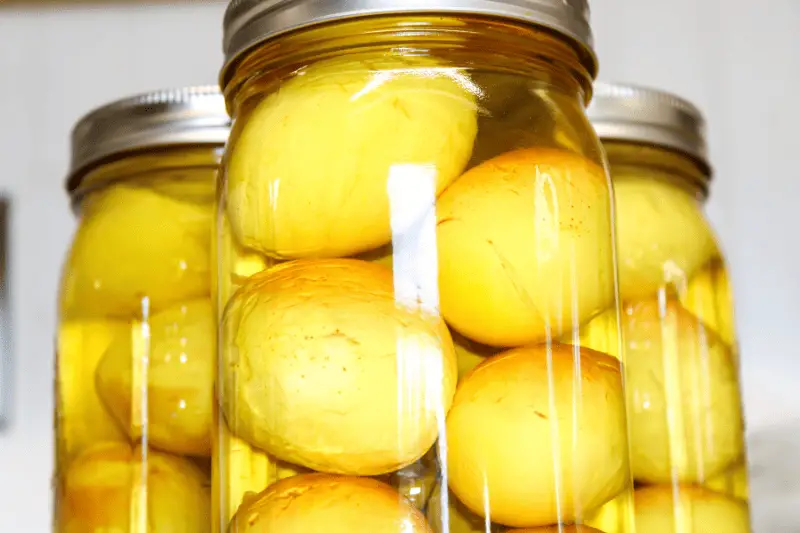Are you looking to add a burst of tangy and zesty flavor to your culinary adventures? Look no further than pickled lime eggs.
These delightful treats offer a unique combination of citrusy tang and savory goodness.
In this article, we will take you through the step-by-step process of pickling eggs with lime, providing you with all the information you need to create your very own batch of these deliciously tangy treats.

How to Pickle Lime Eggs?
Pickled lime eggs, also known as lime-pickled eggs, are hard-boiled eggs that have been transformed into flavor-packed delights through a process of soaking them in a brine made with lime juice, vinegar, and an assortment of spices.
This traditional preservation method infuses the eggs with a distinct citrusy taste, turning them into a tangy and flavorful delicacy.
Benefits of Pickled Lime Eggs
- Enhanced Flavor: The pickling process imparts a refreshing and tangy flavor to the eggs, making them an exciting addition to your taste buds.
- Extended Shelf Life: Through pickling, the eggs’ shelf life is significantly extended, allowing you to savor them for an extended period.
- Versatility: Pickled lime eggs can be enjoyed as a standalone snack, sliced and added to salads, or used to enhance the flavors of sandwiches and appetizers.
Step-by-Step Guide to Pickle Lime Eggs
Choosing the Right Eggs
Begin by selecting fresh, high-quality eggs. Look for eggs that are free from cracks or any signs of spoilage.
Starting with good eggs will ensure the best results in your pickling journey.
Preparing the Lime Brine
To create the flavorful brine, gather the following ingredients:
- Freshly squeezed lime juice
- Vinegar
- Salt
- Sugar
- Assorted spices (such as peppercorns, coriander seeds, bay leaves, or cloves)
In a saucepan, combine the lime juice, vinegar, salt, sugar, and spices. Bring the mixture to a gentle simmer, allowing the flavors to meld together and create a fragrant and tangy brine.
Boiling and Cooling the Eggs
Place the selected eggs in a saucepan and cover them with cold water. Bring the water to a boil over medium heat.
Once the water reaches a rolling boil, reduce the heat and let the eggs simmer for about 10 minutes. This cooking time ensures that the eggs are fully cooked and ready for pickling.
After boiling, carefully transfer the eggs to an ice bath to cool them rapidly and halt the cooking process. The ice bath also helps make peeling the eggs easier.
Peeling the Eggs
Once the eggs are cool enough to handle, gently tap each egg on a hard surface to crack the shell. Roll the cracked egg gently between your hands to loosen the shell.
Begin peeling from the wide end, where the air pocket is located.
Peeling the eggs when they are still slightly warm makes the process smoother and reduces the chances of the egg white sticking to the shell.
Adding the Eggs to the Lime Brine
Prepare a clean glass jar or container for pickling. Place the peeled eggs into the jar, ensuring they fit snugly without excessive crowding.
Pour the prepared lime brine over the eggs, ensuring that they are completely submerged. The brine acts as a flavoring and preservation agent.
If desired, you can add additional spices, herbs, or even slices of chili peppers to the jar to infuse more flavors into your pickled eggs.
This step allows for customization and experimentation based on your preferences.
Flavoring the Pickled Lime Eggs
The next crucial step is to allow the eggs to marinate in the lime brine. Seal the jar tightly and place it in the refrigerator for a minimum of 24 hours.
During this time, the eggs will absorb the tangy lime flavor, transforming into vibrant and zesty treats.
For those who prefer a stronger lime flavor, you can let the eggs marinate for up to a week. The longer they soak, the more pronounced the citrusy tang becomes.
Feel free to adjust the marinating time according to your taste preferences.
Storing and Maturing the Pickled Eggs
After the initial marinating period, your pickled lime eggs are ready to be stored. Keep the jar tightly sealed and place it in the refrigerator for a period of one to two weeks.
This additional time allows the flavors to mature and develop further, enhancing the overall taste of the pickled eggs.
Serving and Enjoying Pickled Lime Eggs
Once fully pickled and matured, remove the eggs from the brine and rinse them gently under cold water to remove any excess brine.
Pat the eggs dry with a paper towel, and they are now ready to be savored.
Pickled lime eggs can be enjoyed in various ways.
Serve them as a standalone snack, slice them and incorporate them into salads, or add them as a tangy garnish to sandwiches and appetizers.
The possibilities are endless, limited only by your creativity and taste preferences.
Pickled Lime Egg Variations
While the traditional pickled lime eggs are already a delightful treat, you can experiment with different variations to suit your palate. Here are a few ideas:
- Spicy Pickled Lime Eggs: For those who crave a bit of heat, add sliced chili peppers or a dash of hot sauce to the brine for an extra kick.
- Sweet and Tangy Pickled Lime Eggs: If you prefer a balance of sweet and tangy flavors, increase the sugar content in the brine to achieve the desired taste.
- Herb-Infused Pickled Lime Eggs: Add fresh herbs like dill, cilantro, or basil to the brine to infuse your pickled eggs with an herbaceous twist.
Don’t be afraid to experiment with different flavors and combinations. Enjoy the process of creating unique pickled lime eggs tailored to your preferences.
Common Mistakes to Avoid
To ensure the best results, it’s essential to be aware of common mistakes that can affect the outcome of your pickled lime eggs. Avoid the following pitfalls:
- Using old or expired eggs: Always start with fresh eggs to prevent spoilage during the pickling process. Check the expiration date and inspect the eggs for any cracks or signs of spoilage before proceeding.
- Skipping the boiling step: Properly cooking the eggs before pickling is crucial to ensure food safety. Make sure to simmer the eggs for the recommended time to achieve a fully cooked result.
- Storing pickled eggs at room temperature: It’s important to store pickled lime eggs in the refrigerator at all times. Room temperature storage can promote bacterial growth and lead to spoilage.
By avoiding these mistakes, you can enjoy delicious and safe pickled lime eggs that will tantalize your taste buds.
Final Thoughts
In conclusion, pickled lime eggs are a fantastic way to add a burst of tangy flavor to your culinary repertoire.
By following the step-by-step guide provided in this article, you can create your own batch of pickled lime eggs and embark on a delightful journey of taste and creativity.
Experiment with different variations and savor the unique combination of citrusy tang and savory goodness that pickled lime eggs have to offer.
So why wait? Get ready to tantalize your taste buds and impress your guests with these flavorful treats.
FAQs
Q: Can I pickle eggs without using lime? A: Absolutely! While lime adds a distinct citrusy tang, you can pickle eggs using other ingredients such as vinegar, beet juice, or various brine solutions.
Q: How long do pickled lime eggs last? A: When properly stored in the refrigerator, pickled lime eggs can last for up to 2 to 3 months. However, it’s always recommended to check for any signs of spoilage before consuming.
Q: Can I reuse the lime brine for pickling? A: It’s generally recommended to discard the used brine and prepare fresh brine for subsequent pickling batches. This ensures optimal flavor and food safety.
Q: Can I adjust the spiciness of pickled lime eggs? A: Absolutely! You can control the level of spiciness by adjusting the amount of chili peppers or hot sauce added to the brine. Feel free to experiment and find the perfect balance for your taste buds.
Q: Are pickled lime eggs safe to consume? A: If prepared and stored correctly, pickled lime eggs are safe to consume. However, it’s always essential to check for any signs of spoilage, such as off-putting odors, mold, or discoloration, before eating them.
Q: Where can I find more recipes and variations of pickled eggs? A: There are numerous online resources, cookbooks, and culinary communities that offer a wide range of pickled egg recipes and variations. Explore these sources to expand your pickling repertoire.
